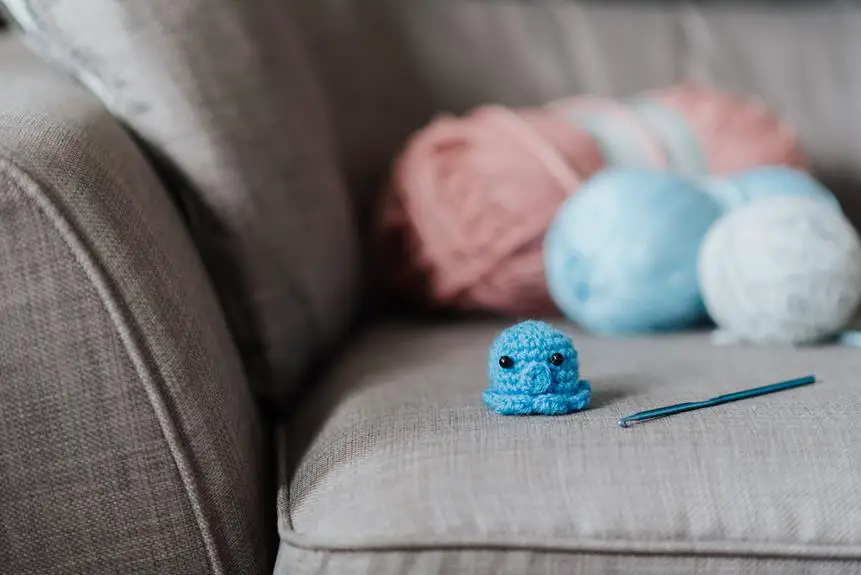Looking to perfect your crochet projects with a homemade starch that adds just the right amount of stiffness? You're in the right place. Mastering the art of crochet often means finding the perfect finishing touch, and homemade starch can make all the difference.
From cornstarch to tapioca starch, there are various options to explore, each with its unique benefits for achieving the desired result.
In this guide, you'll discover the secrets to creating your own homemade starch for crochet, giving you the mastery and control you seek in your crafting endeavors.
Key Takeaways
- Cornstarch, rice flour, potato starch, and tapioca starch are all natural and eco-friendly options for stiffening crochet projects.
- These homemade starches are easy to prepare and apply, requiring simple ingredients like water and flour.
- Homemade starches provide a sturdy and durable finish to crochet pieces.
- Alternative starch options like arrowroot starch, cassava starch, and homemade yucca starch can also be used as homemade alternatives to store-bought stiffeners.
Cornstarch Homemade Starch Recipe
If you want to stiffen your crochet projects, you can make a simple homemade starch using cornstarch. This natural option is eco-friendly and easy to prepare.
Cornstarch, derived from the endosperm of the corn kernel, is a common ingredient for making homemade starch. It's a popular choice because it's readily available and works effectively to stiffen crochet projects.
If you prefer natural options, you can also explore alternatives such as arrowroot powder or tapioca starch. These alternatives are equally eco-friendly and can produce similar results when used in DIY starch recipes.
To create a basic cornstarch starch, mix 1 tablespoon of cornstarch with 2 cups of water in a saucepan. Heat the mixture over medium heat, stirring constantly until it thickens. Allow the starch to cool before using it on your crochet pieces.
This simple and eco-friendly starch recipe will help you achieve the desired stiffness for your crochet projects.
Rice Flour Starch for Crochet
You can also consider using rice flour as an alternative starch for stiffening your crochet projects, providing another eco-friendly option with similar effectiveness to cornstarch. Rice flour offers a great alternative for stiffening your crochet work, and it has its own unique set of benefits.
Here are some reasons why rice flour is a great choice for your crochet stiffening needs:
- Smooth Texture: Rice flour creates a smooth, even coating on your crochet projects, giving them a professional and polished look.
- Natural and Eco-Friendly: Using rice flour as a stiffening agent is an environmentally friendly option, as it's a natural product that doesn't introduce harmful chemicals into the environment.
- Easy to Work With: Rice flour mixes easily with water to create a starch solution, making it convenient to use for stiffening your crochet pieces.
- Durable Finish: Once dried, rice flour starch provides a sturdy and durable finish, ensuring that your crochet projects maintain their shape over time.
Incorporating rice flour into your crochet stiffening routine can be a wonderful choice, offering a natural and effective alternative to traditional starches.
Potato Starch Solution for Stiffening
Looking to stiffen your crochet projects with a homemade starch solution? If you're seeking an alternative to rice flour starch, potato starch could be the perfect solution.
This versatile starch offers a simple and effective way to achieve the desired stiffness in your crochet creations.
Stiffen Crochet With Starch
To stiffen crochet, use a potato starch solution for effective stiffening. Here's how to do it:
- Prepare the Solution: Mix 1 tablespoon of potato starch with 1 cup of water in a pot.
- Heat and Stir: Heat the mixture over medium heat while stirring constantly until it thickens and becomes clear.
- Cool the Solution: Remove the pot from the heat and let the solution cool to room temperature.
- Apply to Crochet: Dip your finished crochet project into the cooled starch solution, gently squeeze out the excess, shape it as desired, and let it dry.
This eco-friendly homemade solution will give your crochet projects the perfect amount of stiffness for shaping ornaments, doilies, or any other desired project.
Potato Starch Alternative
If potato starch isn't readily available, consider using a cornstarch solution as an alternative for stiffening your crochet projects.
Homemade starch alternatives like cornstarch can be an effective DIY stiffening solution for your crocheted items.
To create a cornstarch solution, mix 1 tablespoon of cornstarch with 2 cups of water in a saucepan. Heat the mixture over medium heat, stirring constantly until it thickens.
Once the solution has thickened, allow it to cool before using it to stiffen your crochet work.
This homemade starch alternative can provide a similar stiffening effect as potato starch.
When using cornstarch as a substitute, follow the same application process as you'd with potato starch, ensuring your crochet project achieves the desired level of stiffness.
Tapioca Starch: A Natural Stiffener
Looking for a natural way to stiffen your crochet projects? Tapioca starch might just be the answer you're looking for.
This natural and easily accessible ingredient offers a range of benefits for stiffening your crochet work, making it a popular choice among crafters.
Let's explore how tapioca starch can elevate your crochet projects and become your go-to stiffening method.
Tapioca Starch Benefits
When you want to stiffen your crochet projects naturally, tapioca starch offers numerous benefits as a homemade alternative. This sustainable sourcing option has a minimal environmental impact and provides health benefits, making it an ideal choice for your projects.
Here are four compelling reasons to consider tapioca starch:
- Natural and Gentle: Tapioca starch is derived from the cassava plant, making it a natural and gentle option for stiffening your crochet pieces.
- Non-Toxic: Unlike some commercial stiffeners, tapioca starch is non-toxic, ensuring that your finished crochet items are safe for everyday use.
- Easy to Use: Tapioca starch is simple to prepare and apply, allowing you to achieve the desired level of stiffness for your crochet projects.
- Cost-Effective: In addition to its natural benefits, tapioca starch is a cost-effective alternative to commercial stiffeners, providing excellent value for money.
Starch for Crochet
How can you effectively utilize tapioca starch as a natural stiffener for your crochet projects?
Tapioca starch is a fantastic alternative to chemical-laden commercial starches for stiffening your crochet creations. To use tapioca starch as a stiffening agent, start by mixing it with water to create a solution. Then, soak your finished crochet piece in the solution, gently squeeze out the excess liquid, and shape it as desired.
Allow it to air dry, and you'll have a beautifully stiffened creation. This natural stiffening technique not only helps maintain the shape of your crochet work but also eliminates any concerns about exposure to harsh chemicals.
Tapioca starch offers a sustainable and eco-friendly approach to achieving the perfect level of stiffness for your crochet projects.
Natural Stiffening Method
You can achieve the perfect level of stiffness for your crochet projects by utilizing tapioca starch as a natural stiffener. This eco-friendly stiffening method provides a sustainable crochet stiffening option that's both effective and gentle on the environment.
Here's how to do it:
- Create the Solution: Mix tapioca starch with water to create a solution with the desired level of stiffness.
- Soak Your Crochet Piece: Submerge your finished crochet item into the tapioca starch solution, ensuring it's fully saturated.
- Shape and Dry: Gently shape your crochet piece into the desired form and let it dry completely.
- Enjoy Your Stiffened Crochet: Once dry, your crochet piece will maintain its shape beautifully, thanks to the natural stiffening properties of tapioca starch.
Arrowroot Starch for Crochet Projects
Considering using arrowroot starch for your crochet projects? Arrowroot starch offers a natural stiffening method that's perfect for stiffening crochet projects like doilies and ornaments.
One of the main benefits of arrowroot starch is that it's a homemade starch alternative to store-bought stiffeners, making it an appealing option for those who prefer organic and natural materials. When using arrowroot starch, you can create a stiffening solution by mixing it with water and then applying it to your crochet work. This allows you to have more control over the stiffness of the finished piece.
Additionally, arrowroot starch is a great alternative to other natural stiffeners like organic yucca stiffener, as it's readily available in many grocery stores and can be used in various crafting projects.
Whether you're looking to add stiffness to your crochet creations or seeking a natural and organic stiffening method, arrowroot starch is definitely worth considering for your next project.
Homemade Starch From Wheat Flour
If you're interested in exploring another homemade starch option for stiffening your crochet projects, homemade starch from wheat flour can provide a natural and accessible alternative. Making homemade starch from wheat flour isn't only easy but also offers several benefits for your crochet projects.
Here's how to make it:
- Simple Ingredients: All you need is wheat flour and water, making it a convenient and affordable option for stiffening your crochet creations.
- Natural and Non-Toxic: Unlike some commercial starches that may contain chemicals, homemade wheat flour starch is a natural and non-toxic alternative, ensuring that your crochet items remain safe to use.
- Versatility: Wheat flour starch can be easily adjusted to achieve the desired level of stiffness for different crochet projects, giving you more control over the final outcome.
- Eco-Friendly: By using wheat flour starch, you're opting for an eco-friendly alternative that reduces the need for purchasing single-use plastic bottles of commercial starch.
Exploring wheat flour alternatives for homemade starch provides a sustainable and effective way to stiffen your crochet projects while offering the benefits of a natural, non-toxic, and versatile solution.
Cassava Starch: An Alternative Stiffening Agent
An alternative to homemade starch from wheat flour is cassava starch, which offers another natural and eco-friendly option for stiffening your crochet projects. Cassava starch, derived from the cassava root, boasts a range of benefits that make it an excellent choice for stiffening crochet items. It is a sustainable and eco-friendly alternative to chemical-laden commercial stiffening agents.
Here are some benefits of cassava starch for stiffening your crochet projects:
| Cassava Starch Benefits | Eco-Friendly Stiffening |
|---|---|
| Natural and biodegradable | Sustainable and eco-friendly |
| Easy to source and affordable | Chemical-free and non-toxic |
| Provides a strong hold | Gentle on the environment |
| Versatile and easy to use | Supports sustainable crochet techniques |
| Leaves no residue | Promotes eco-conscious crafting practices |
Homemade Starch From Organic Yucca
You can create homemade starch from organic yucca using a simple cooking process. Here's how to make DIY starch for sustainable crafting:
- Start by peeling the yucca root to reveal the starchy flesh inside.
- Cut the yucca into small pieces and then boil them in water until they become soft.
- Once the yucca is soft, remove it from the water and blend it into a smooth paste.
- Strain the paste through a fine cloth to separate the starch from the fibrous residue, and then allow the starch water to settle. The starch will settle at the bottom, and the water can be poured off.
Yucca root benefits extend beyond just creating homemade starch. It's a versatile plant that offers various environmental impacts, such as being drought-tolerant and requiring minimal pesticides. By utilizing yucca for DIY starch, you aren't only embracing sustainable crafting but also tapping into the eco-friendly properties of this remarkable plant.
Frequently Asked Questions
Can I Use These Homemade Starch Recipes for Other Crafts, Such as Paper Mache or Fabric Stiffening?
Yes, you can use these homemade starch alternatives for a variety of crafts, including paper mache and fabric stiffening. They are versatile and effective for enhancing the durability and structure of different materials.
Are There Any Alternative Uses for the Starches Mentioned in the Article, Such as Cooking or Baking?
Yes, you can use the homemade starches mentioned in the article for cooking and baking. They make great alternatives in recipes that call for starch, adding a unique touch to your culinary creations.
How Long Will the Homemade Starches Last Once Applied to the Crochet Project?
Once applied to the crochet project, homemade starches can last for a long time, depending on the application techniques and environmental factors. Properly applied starch can help maintain the shape and longevity of your crochet project.
Can I Add Scents or Colors to the Homemade Starch for a More Personalized Touch?
Yes, you can definitely add scents and customize colors to the homemade starch for a more personalized touch. It's a great way to make your crochet projects even more unique and special.
Are There Any Potential Drawbacks or Risks to Using Homemade Starches for Crochet Projects, Such as Attracting Pests or Causing Damage to the Yarn Over Time?
Using homemade starch for crochet projects may pose potential drawbacks. It could attract pests and cause damage to the yarn over time. Risks include compromising the integrity of your work, so consider these factors before proceeding.
- Tetron Fabric for Marine Applications: Durability and Use Cases - June 18, 2025
- Tetron Fabric for Outdoor Furniture: Weather Resistance and Care - June 18, 2025
- Tetron Fabric for Wall Coverings: Style and Application Tips - June 18, 2025






